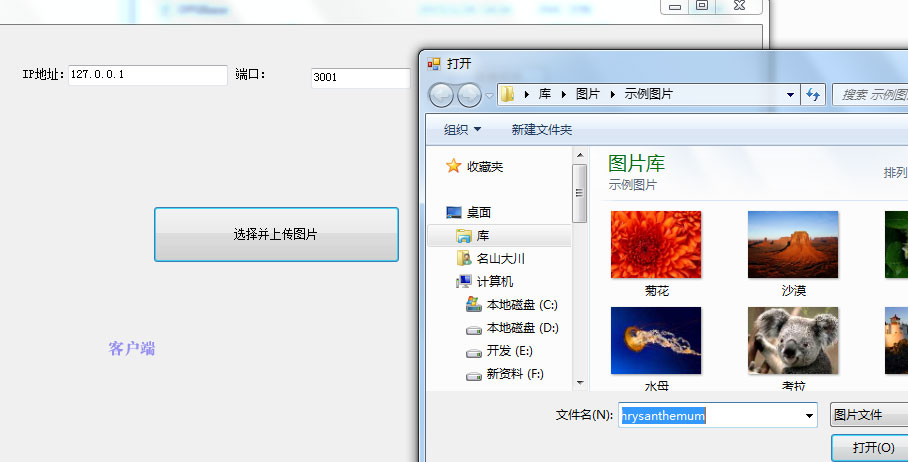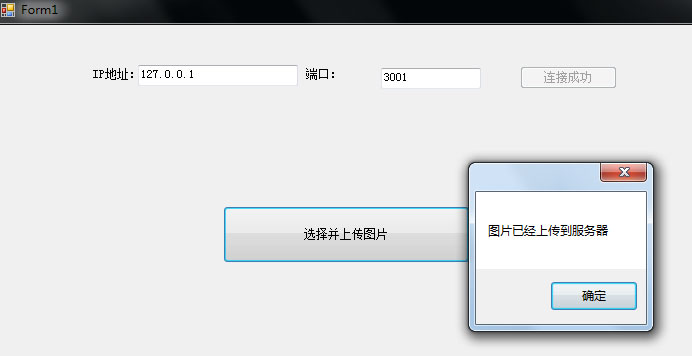源码 (因为空间大小限制,不包含通信框架源码,通信框架源码请另行下载)
以前帮朋友做了一个图片采集系统,客户端采集相片后,通过TCP通信传送到服务器,本文把客户端传送图片到服务器的这部分提取出来。
由于每张图片的大小都不大,所以我们在传输图片时,没有采用传送文件的方式,而是采用了直接序列化图片的方式来进行。
当前支持的图片类型: jpg,png,gif 您可以自己添加扩充支持的图片类型
通信框架采用英国的开源的networkcomms2.3.1 通信框架 序列化器采用开源的protobuf.net

我们先开看一下实现的效果
服务器端:

客户端:


在服务器端,我们把收到的图片保存在D盘根目录下(您可以另外指定路径),打开D盘看到收到的图片如下:

下面看一下具体的过程
第一步,首先进行服务器端的设置
(1)监听端口:
IPEndPoint thePoint = new IPEndPoint(IPAddress.Parse(txtIP.Text), int.Parse(txtPort.Text)); TCPConnection.StartListening(thePoint, false); button1.Text = "监听中"; button1.Enabled = false;
(2) 针对图片上传写对应的处理方法:
NetworkComms.AppendGlobalIncomingPacketHandler<ImageWrapper>("UploadImage", IncomingUploadImage);
//处理客户端发来的图片 private void IncomingUploadImage(PacketHeader header, Connection connection, ImageWrapper wrapper) { try { //具体的解析工作由通信框架完成 //从图片包装器中获取到图片文件和图片名称 Image image = wrapper.Image; string fileName = wrapper.ImageName; //获取文件扩展名 int index = fileName.LastIndexOf('.'); string extion = fileName.Substring( index + 1, fileName.Length - index - 1); extion = extion.ToLower(); //设置文件格式 ImageFormat imageFormat = ImageFormat.Bmp; switch (extion) { case "jpg": case "jpeg": imageFormat = ImageFormat.Jpeg; break; case "png": imageFormat = ImageFormat.Png; break; case "gif": imageFormat = ImageFormat.Gif; break; }
//此处,我们手工指定了一个保存路径,您可以自定义 image.Save(@"D:\" + fileName, imageFormat); ResMsgContract contract = new ResMsgContract(); contract.Message = "上传成功"; //发送回复信息给客户端 connection.SendObject("ResUploadImage", contract); } catch (Exception ex) { } }
第二步:客户端的设置
(1)连接服务器:
//给连接信息对象赋值 connInfo = new ConnectionInfo(txtIP.Text, int.Parse(txtPort.Text)); //如果不成功,会弹出异常信息 newTcpConnection = TCPConnection.GetConnection(connInfo); TCPConnection.StartListening(connInfo.LocalEndPoint); button1.Enabled = false; button1.Text = "连接成功";
(2)从本地选择图片并上传
openFileDialog1.Filter = "图片文件|*.jpg|所有文件|*.*"; if (openFileDialog1.ShowDialog() == DialogResult.OK) { string shortFileName = System.IO.Path.GetFileName(openFileDialog1.FileName); //图片包装类 ImageWrapper wrapper = new ImageWrapper(shortFileName, Image.FromFile(openFileDialog1.FileName)); //发送图片包装类到服务器,并获取返回信息 ResMsgContract resMessage = newTcpConnection.SendReceiveObject<ResMsgContract>("UploadImage", "ResUploadImage", 8000, wrapper); if (resMessage.Message == "上传成功") { MessageBox.Show("图片已经上传到服务器"); } else { MessageBox.Show("图片没有发送成功"); } }
(三)关于 ImageWrapper类
在客户端与服务器端通信的过程中,我们注意到上面的程序中使用了一个ImageWrapper类,用来传递图片(Image)对象。
ImageWrapper类,存放在MessageContract类库中,此类用来序列化图片
我们知道Image类并不直接支持序列化,所以我们采用的方式是序列化之前把Image转化为二级制数据,反序列化之前再把二级制数据转化为Image类。
我们只负责定义ImageWrapper类,其他工作通信框架帮我们做好了。

using System;using System.Collections.Generic;using System.Text;using ProtoBuf;using System.Drawing;using System.IO;using ProtoBuf;namespace MessageContract{ [ProtoContract] public class ImageWrapper { /// <summary> /// 把Image对象存储为私有的字节数组 /// </summary> [ProtoMember(1)] private byte[] _imageData; /// <summary> /// 图片名称 /// </summary> [ProtoMember(2)] public string ImageName { get; set; } /// <summary> /// 图片对象 /// </summary> public Image Image { get; set; } /// <summary> /// 私有的无参数构造函数 反序列化时需要使用 /// </summary> private ImageWrapper() { } /// <summary> /// 创建一个新的 ImageWrapper类 /// </summary> /// <param name="imageName"></param> /// <param name="image"></param> public ImageWrapper(string imageName, Image image) { this.ImageName = imageName; this.Image = image; } /// <summary> ///序列化之前,把图片转化为二进制数据 /// </summary> [ProtoBeforeSerialization] private void Serialize() { if (Image != null) { //We need to decide how to convert our image to its raw binary form here using (MemoryStream inputStream = new MemoryStream()) { //For basic image types the features are part of the .net framework Image.Save(inputStream, Image.RawFormat); //If we wanted to include additional data processing here //such as compression, encryption etc we can still use the features provided by NetworkComms.Net //e.g. see DPSManager.GetDataProcessor<LZMACompressor>() //Store the binary image data as bytes[] _imageData = inputStream.ToArray(); } } } /// <summary> /// 反序列化时,把二进制数据转化为图片对象 /// </summary> [ProtoAfterDeserialization] private void Deserialize() { MemoryStream ms = new MemoryStream(_imageData); //If we added custom data processes we have the perform the reverse operations here before //trying to recreate the image object //e.g. DPSManager.GetDataProcessor<LZMACompressor>() Image = Image.FromStream(ms); _imageData = null; } }}
工作到此完成,很少的代码量,就帮我们实现了传递客户端图片保存在服务器的功能。
注意:此种方式并不适合传递比较大的图片,如果图片比较大,比如10M以上,最好以传送文件的形式,分段发送.
